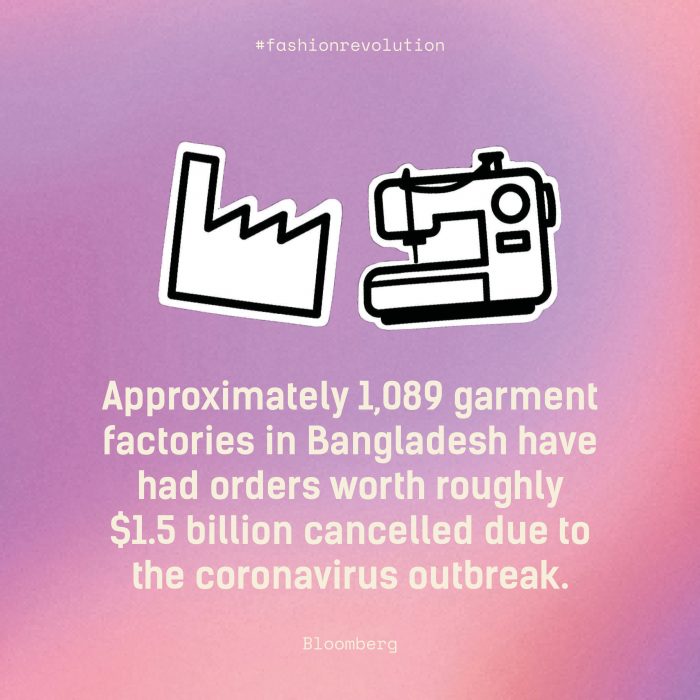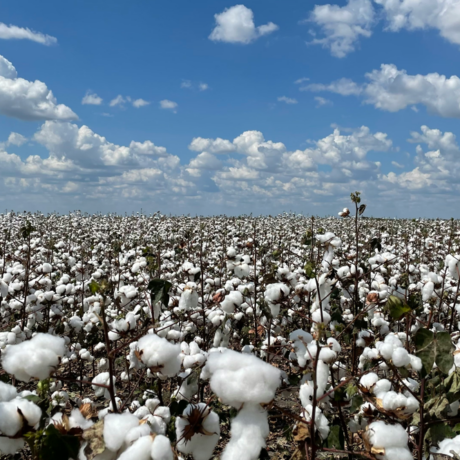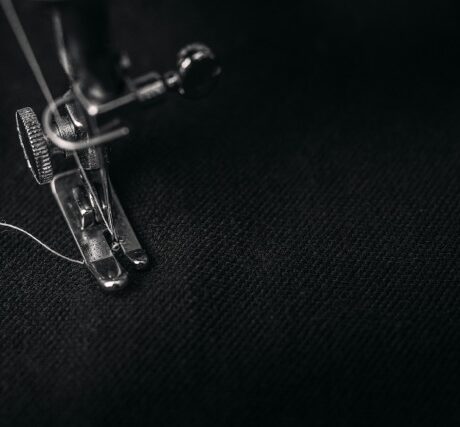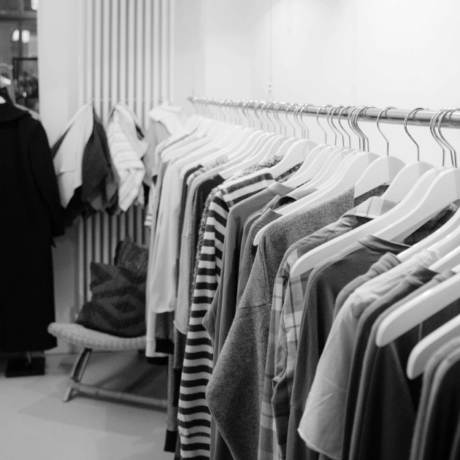The impact of COVID-19 on the people who make our clothes
As it happens: We’re updating this article frequently, as new information emerges about the impact of COVID-19 on supply chain workers around the world, and adding new fundraising appeals to help support workers. Click here for the latest updates.
As the world faces this pandemic in unified isolation, we at Fashion Revolution are focusing on how the unfolding situation is affecting the people who make our clothes. Retailers are shutting their doors around the world, encouraging their customers to shop online instead. Yet the reality is that as we are forced to stay in our homes many of us are financially burdened by layoffs or new childcare responsibilities, and the desire to buy new clothes feels like a distant dream.
For Fashion Revolutionaries, this unique set of circumstances can hopefully bring about the #LovedClothesLast movement that we have been pushing for many years. Given the level of clothing overproduction that preceded this crisis, we hope that our days indoors can bring about revolutions in caring for our clothes better, mending and making clothing, and adopting a mindset of longevity when it comes to our wardrobes.
While we have been encouraging an end to overconsumption for many years, we also know that in the face of this unexpected halt in manufacturing, it is the most vulnerable, lowest paid people in the fashion supply chain that feel the worst effects. IndustriALL, the global trade union which works to give workers around the world a voice, says that millions of garment makers have already lost their jobs as a result of the virus and have no access to social or financial safety nets to help them weather this storm. Writing for the Business of Fashion, Bangladeshi garment manufacturer Mostafiz Uddin reminds us, “Poverty is a killer too, and many more people die from poverty than from COVID-19”.
In the global fashion industry, brands typically pay their suppliers weeks or even months after delivery, rather than upon order. This means that suppliers usually pay upfront for the materials or fibres used to make the products brand buy from them. In response to the pandemic, many major fashion brands and retailers are cancelling orders and stopping payments for orders already placed, even when the work has already been done, taking no responsibility for the impact this has on the people working in their supply chains. Factories are left with little choice but to destroy or keep hold of unwanted goods already made and lay off their workers in droves.
 Bloomberg reports that about 1,089 garment factories in Bangladesh have had orders cancelled worth roughly $1.5 billion due to the coronavirus outbreak. The AWAJ Foundation says that many factories in Bangladesh have been shut down indefinitely. Some workers were given less than a month’s salary as severance and many others have received nothing at all. Nazma Akter the executive director of AWAJ explains, “These workers now don’t know how they will take care of their families in the coming days – how they will manage costs for food, rent and other necessities. They can’t even imagine what they’ll do if they or a family member needs medical treatment for COVID-19. The meager income these workers earned was barely enough to cover their living costs, and as a result, they have little to no savings set aside to deal with a crisis such as this.” Meanwhile, Labour Behind the Label estimates that 10% of factories in Yangon, Myanmar are now closed.
Bloomberg reports that about 1,089 garment factories in Bangladesh have had orders cancelled worth roughly $1.5 billion due to the coronavirus outbreak. The AWAJ Foundation says that many factories in Bangladesh have been shut down indefinitely. Some workers were given less than a month’s salary as severance and many others have received nothing at all. Nazma Akter the executive director of AWAJ explains, “These workers now don’t know how they will take care of their families in the coming days – how they will manage costs for food, rent and other necessities. They can’t even imagine what they’ll do if they or a family member needs medical treatment for COVID-19. The meager income these workers earned was barely enough to cover their living costs, and as a result, they have little to no savings set aside to deal with a crisis such as this.” Meanwhile, Labour Behind the Label estimates that 10% of factories in Yangon, Myanmar are now closed.
On the other side of the world a similar situation is unfolding. The Garment Worker Center describes how garment makers in Los Angeles are often not eligible for unemployment benefits. This is partly because the underground nature of the industry, such as “off the books” work, makes applying for paid family leave or disability insurance uniquely challenging in the face of the pandemic.
IndustriALL reports that while many fashion brands are offering compensation packages for retail and office workers who face layoffs due to this crisis, they are failing to protect the workers in their supply chains who are also suffering from the loss of income. Furthermore, the Solidarity Center believes that the inability to meet together in-person will inhibit workers’ abilities to unionise and collectively bargain for their rights.
Of course, fashion isn’t just created in factories. Fashion is craft, artisanship and things that are often made by hand in informal environments. According to the Artisan Alliance, artisanal craft is the second largest source of employment across the so-called developing world. WIEGO estimates there are around two billion informal workers around the world that lack basic labour, social and health protections. As a result of COVID-19 threatening global trade flows, workers cooperatives, artisan groups, local crafts-based communities, home-based workers, agricultural workers and farmers face desperate economic circumstances.
At Fashion Revolution, we have always tried to be honest with our community about the problems that persist within the global fashion industry. Having formed in response to major human catastrophe – the Rana Plaza collapse in 2013 – we are no strangers to exploitation or disparity within the industry. But we have been, and will continue to be, focussed on solutions and dedicated to finding ways for citizens around the world to make a positive difference. We’ve already seen several visionaries within the fashion industry pose the question: what kind of world do we want to see emerge after this crisis is over? For us, the answer lies in our Manifesto for a Fashion Revolution, and we’ll be spending the next months (and years) mobilising our community to take action to build this future of fashion.

Meanwhile, in this current crisis, we believe that our capacity for empathy is strengthened by our shared global experience. While we may be stuck indoors, using social media our voices can still be amplified, especially when we speak up together. That’s why we’re asking our global community to be louder than ever. To ask #WhoMadeMyClothes? and demand that fashion brands protect the workers in their supply chain just as they would their own employees, especially during this unprecedented global health and economic crisis.
If we do nothing, the fashion industry will simply return to business as usual when this is all over. Instead, let’s come together as a revolution and build a new system that values the wellbeing of people and planet over profit. This means that right now we should stand together to protect and support the people who make our clothes.
As Wangari Maathai said in her famous 2004 Nobel Peace Prize acceptance speech,
“In the course of history, there comes a time when humanity is called to shift to a new level of consciousness, to reach a higher moral ground. A time when we have to shed our fear and give hope to each other. That time is now.”
In this spirit, we are asking you to take three crucial actions to support the people who make our clothes, especially during this unprecedented global health and economic crisis.
1. Send a letter to your favourite fashion brands and demand that they honour the orders they have already placed with their suppliers and ensure that the workers making their products are protected, supported and paid properly during this crisis. We have created a pre-populated letter template that you can quickly and easily use to contact brands by email or via social media.
EMAIL THE BRAND…
2. Give Money directly to non-profit organisations that are providing support to garment makers that have lost their jobs. We recommend giving money to:
- AWAJ Foundation – A non-profit organisation founded and led by garment workers in Bangladesh that provides support to over 740,000 workers. This includes legal aid, healthcare, union organising, labour rights training and industry and policy advocacy. Donations will go directly to workers who have lost their jobs. This will mainly be in the form of cash disbursements to make sure that their basic needs for food and shelter are met. If you would like to make a contribution then please write to: awaj@dhaka.net.
- The Garment Worker Centre – A non-profit organising and community space in Los Angeles that supports tens of thousands of low paid garment workers, especially immigrant and undocumented workers, women of colour, and their families. 100 of their worker members have sounded the alarm bell about losing their jobs and reduced hours due to COVID-19 as well as lack of hygienic conditions in the factories that are still operating, many now making PPE. You can donate here: https://garmentworkercenter.org/
- GoodWeave International — An non-profit organisation working to end forced and child labour in global supply chains. They have launched the COVID-19 Child and Worker Protection Fund to deliver immediate humanitarian aid and services to vulnerable populations in India, Nepal and Afghanistan. Money raised will pay for the delivery of food and resources to workers and their children. Donate here.
- The World Fair Trade Organisation (WFTO) has launched the #StayHomeLiveFair campaign to support its global network of workers, farmers, artisans and communities during the crisis. You can support by visiting their webshop and supporting their members’ crowdfunding efforts, here.
- CARE, the global social justice NGO, has been working in the garment industry for over 20 years and is focussing on protecting and supporting the rights and needs of women and girls during the pandemic. CARE’s Emergency Surge Fund is matching all donations and using funds to urgently provide families with hygienic masks, hand washing stations and hygiene kits. Donate here.
3. Donate to Fashion Revolution so that we can continue asking brands the tough questions and mobilising citizens to campaign for a fashion industry that respects workers and protects our planet and continue to amplify the stories of garment workers around the world.
NEW UPDATES:
- How major brands and retailers are responding to questions about their handling of the crisis and impacts on suppliers and supply chain workers:
-
- UK retailer Primark announced it would create a fund to pay its supply chain workers. But questions still remain over whether the brand will be receiving and paying for orders already made or in-production from its factories, including covering the costs of raw materials that factories have paid for in advance to manufacture their orders not yet in production.
-
- H&M, Target, Marks & Spencer, Inditex, Kiabi, and PVH have all publicly confirmed that they intend to receive and pay for products already made and orders already placed, but in some cases, no time frame has been outlined on when payments will be made – keeping in mind the urgency of the crisis and its catastrophic impact on workers unfolding already.
-
- Brands that have yet to respond to calls asking them to #PayUP include C&A, Mothercare, Bestseller, Tesco, Kohls, Walmart, LPP, JCPenney, among others. At the time of writing, we cannot confirm whether these brands have paid for completed and in-production orders. However, they have not publicly responded when called on to make payments in a report by the Global Center for Workers’ Rights.
-
- UK retailer New Look has sent a letter to its suppliers cancelling in-production orders and suggesting payments would be delayed “indefinitely”. The retailer told suppliers, “This is a matter of survival”. Yet, like many brands in crisis, the fight for survival often doesn’t extend to supply chain workers or stakeholders not directly employed by the big brands.
- UK Charity, Traidcraft Exchange has published a report outlining the governmental responses required by garment producing countries to support workers. They argue how the consequences of COVID-19 unveil a fashion system already reliant on widespread exploitation and an imbalance of power between big brands and developing economies. The report notes, “This supply-side model has not been compatible with the establishment of deep and wide social protection coverage. Instead, [producing] countries have, under pressure from financial institutions, followed a race to the bottom through wage suppression, deregulation and privatisation. Faced with the collapse of orders combined with the effect of the COVID-19 virus, these countries are all ill-equipped to provide support to the increasing numbers of sick people, workers at risk of exposure and families without income.”
- IndustriALL Global Union , has urged signatories of its living wage coalition, ACT, to pay for all already-placed orders. The organisation also notes, “The government of Bangladesh will make available 50 billion Bangladeshi Taka (US$581,000) late April. However, this will be enough to pay workers’ wages for one month and it is a loan, which the employers have to pay back with 2 per cent interest.”
- In South Africa, SACTWU (The South African Clothing and Textile Workers’ Union) entered into a collective agreement with the National Bargaining Council for the Clothing Manufacturing Industry to ensure that workers receive 100% of their salaries during South Africa’s lockdown.
- In Myanmar, thousands of garment workers have marched in protest of mass layoffs. The workers are asking not for a compensation package or due severance, but demand that the factories keep them on payroll.
- After the entire country of India was put on lockdown, it became clear that mass starvation may surpass the threat of Coronavirus as migrant workers are unable to return to town and villages with public transportation halted, many are left homeless in city centres. And with supplies still needed for hospitals, some factories still remain open, subjecting their workers to potential infection at the expense of urgently needed medical goods.
- In Tamil Nadu, where some 40,000 factories and mills operate, dormitory style living conditions will make social distancing near impossible. Experts warn that factory closures will reinforce the crowded surroundings, as lack of shift work means all lodgers are cramped into rooms at once.
- A video has circulated on Instagram showing what looks like a garment sweatshop manufacturing face masks in extreme unhygienic conditions. With many clothing brands having offered up their supply chains to fill a shortage of face masks, this horrible image isn’t just startling due to the unsanitary conditions in which these life-saving masks are being made – it’s a reminder that the fashion industry continues to operate in exploitative conditions, with little transparency.
RESPONSES WE HAVE RECEIVED…
- “These workers now don’t know how they will take care of their families in the coming days – how they will manage costs for food, rent and other necessities. They can’t even imagine what they’ll do if they or a family member needs medical treatment for the Corona Virus. The meager income these workers earned was barely enough to cover their living costs, and as a result, they have little to no savings set aside to deal with a crisis such as this.” – Nazma Akter, AWAJ Foundation
- “Inditex is committed to working with its suppliers through the impacts of Covid-19. As a priority, we are working closely with suppliers to ensure they are following official guidance to protect the health of workers in factories during the pandemic. We are fulfilling all our responsibilities to our suppliers by ensuring that all orders that have been produced or are currently in production are completely paid according to the original payment terms.” – Inditex
- “In these difficult times, it is our priority to maintain as many jobs as possible. The foregoing pertains both to our employees and to those of our suppliers. We have been receiving information that the effects of the changes have been of particular severity in Bangladesh; therefore, we have been doing our utmost to support our Asian suppliers in this hardship. First and foremost, all our obligations have been settled on an ongoing basis. In addition, we are going to pay for the orders in production and already produced; however, some of them are likely to be received with a delay.” -LPP
- “I am the Managing Director for [UK supplier]. We supply 8 different UK retailers. All of which have stopped paying us overnight and I am currently scrambling to make final payments to my staff and my Vietnamese factories to keep things ticking… I knew full well that the balance of power in the supplier-retailer relationship was off, but I never quite imagined that we would be treated this badly in a time like this. It seems any contract we have in place is completely worthless in their eyes.” – Comment via email
BEYOND THE FACTORIES…
- The British Fashion Council has repurposed its young designer talent support into a relief funding model for young designers in the UK suffering from loss of sales.
- American retailer Everlane has been accused of reassuring it’s customers service and retail staff of their jobs security for weeks – right up until it suddenly layed off the vast majority of those workers. For months, Everlane customer service workers were in the process of forming a union, and now critics are saying that COVID-19 was uptaken by the brand to union-bust.
- Brands big and small are facing huge financial stresses and potentially fatal challenges. Yet still, it’s the large corporations that need to take the lead in supporting their supply chains. Columbia Sportswear is one brand whose CEO is taking a major salary cut and asking senior executives to do the same, to ensure retail employees still receive regular paychecks.
- Warehouse workers in the supply chains of several UK high street brands are begging people to stop ordering frivolous fashion items amid the crisis, as workers doing 12 hour shifts note a surge in sales making social distancing impossible in their workplaces.
We will be updating this statement daily with news about how the COVID-19 pandemic is affecting the people who make our clothes. We will also add new fundraising appeals that support garment makers during this time. If you want us to know about any other fundraising efforts, please contact bronwyn[at]fashionrevolution.org.








